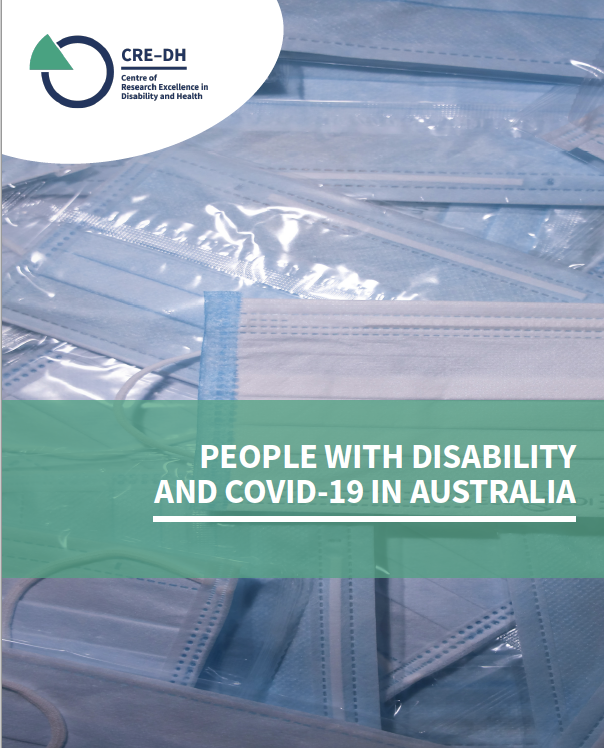COVID-19: POLICY ACTION TO PROTECT PEOPLE WITH DISABILITY IN AUSTRALIA
24 March 2020

There is an urgent need for the disability and health sectors to develop a coordinated response that protects the health of over 4 million Australians with disability.
On 15 March we made recommendations to government for significant measures to protect people with disability and the disability support workforce in the COVID-19 pandemic. While we welcome the outcomes of the Disability Reform Council (28 March) and the media release of Minister Robert (21 March), there are still many areas of concern that threaten the wellbeing of people with disability, their families and the disability support workforce.
In particular, we note the apparent lack of an integrated disability and health service response.
The health sector is still underprepared to meet the health care needs of people with disability.
Our concerns are:
- the lack of accessible testing and health care services and no plan for people with intellectual and development disabilities
- the lack of support for clinicians providing services to people with disability to upscale their telehealth activities to enable high-level health care for people with disability.
Government has mobilised a cross-sectoral approach in aged care and health, but has not paid the same sort of attention to the disability sector. The response so far has largely focussed on changes to NDIS processes.
We strongly recommend that a National Cabinet organises a Committee of expert advisers knowledgeable in disability and health service provision.
This would include academics, clinicians, advocates and government representatives from disability and health sectors, to facilitate rapid evidence-informed decision making that protects the health of people with disabilities, their families and the disability care workforce. This expert committee should report to the Australian Health Protection Principal Committee (AHPPC) who then advise National Cabinet.
Recommendations for healthcare and people with disability
- That a new MBS item is introduced to develop COVID-19 health care plans with children and adults with complex disabilities, so they know how to implement social distancing and hygiene measures and how to access testing and treatment. Health practitioners should remain a single point of contact during the pandemic for COVID-19 and other health care matters.
- That the recently introduced Medicare item for telehealth consultations with primary care and specialist providers be extended to children and adults with disability (who are not included in the current definition of vulnerable populations). They do not qualify for access to these services unless they are in self-isolation or quarantine.
- A dedicated Coronavirus Health Information Hotline for children and adults with disability, families and disability services staffed by people with a deep understanding of disability issues and health co-morbidities. This hotline should operate alongside the existing hotline and share resources.
With respect to the disability care workforce, a number of issues that remain and are likely to undermine the safety, social and economic wellbeing and health of children and adults with disabilities, their families and the disability care workforce. We note the commitment of the Federal government to enable extension of plans, telephone planning, plan flexibility, commitment to ensuring the ongoing provision of essential services and supports, new measures to source workers displaced from other industries and proactive outreach to people with disabilities with complex needs.
It is unclear how these measures will be implemented including how continuity of services can be guaranteed when service gaps arise. Participants are simply referred to the standard 1800 number.
Recommendations for the disability workforce
- Immediate access to personal protective equipment (PPE) to prevent transmission as a prevention strategy. There is a lack of recognition of the need for workers to access personal protective equipment to prevent transmission to the people they support. Because many of these workers see several disabled people in one day, they are very likely to acquire and transmit COVID-19. However, personal protective equipment is only available if they are supporting someone with COVID-19 or suspected COVID-19 infection.
- Guarantee the incomes of families and carers who need to take time off to provide care. In light of school and day service closures in some states and territories, many participants will rapidly need to have changes made to their plans, including a large injection of funds, so that essential supports can be provided. We previously recommended that family members should be paid for providing supports in the pandemic, so families are not placed under undue distress.
- That the NDIS rapidly reach out to self-managed participants particularly those using online platforms, unregistered providers or directly employing support staff to ensure they don’t experience a disruption of supports and have access to PPE for staff when it becomes available
- That disability support is considered and clearly defined as an essential service along with other services such as supermarkets and petrol stations.
We welcome the opportunity to speak with Commonwealth and State and Territory governments at the highest level, the NDIA, and the National Quality and Safeguards Commission to ensure that disabled Australians receive the care and support they require during the COVID-19 pandemic.
Professor Anne Kavanagh, Chair in Disability and Health and Academic Director of the Melbourne Disability Institute, University of Melbourne; Co-Director CRE-DH
Associate Professor Gemma Carey, Research Director, Centre for Social Impact, UNSW; Chief Investigator CRE-DH
Professor Helen Dickinson, Public Service Research, UNSW; Chief Investigator CRE-DH
Professor Gwynnyth Llewellyn, Centre of Disability Research and Policy, University of Sydney; Co-Director CRE-DH
Professor Bruce Bonyhady, Director, Melbourne Disability Institute, University of Melbourne
Further information
Professor Anne Kavanagh: a.kavanagh@unimelb.edu.au
